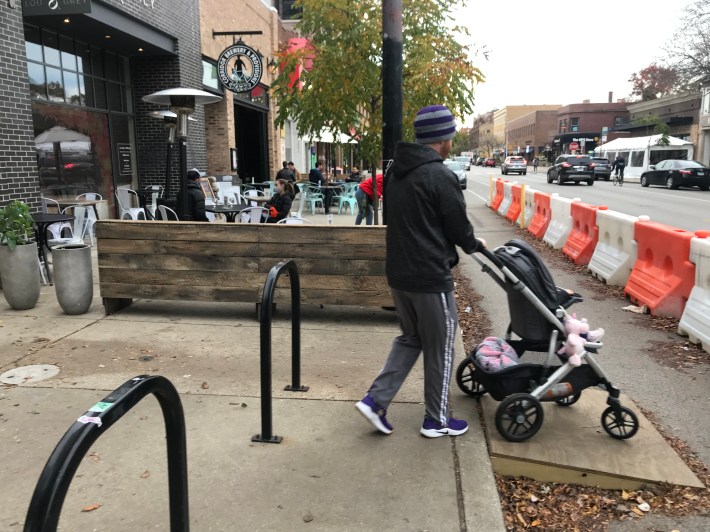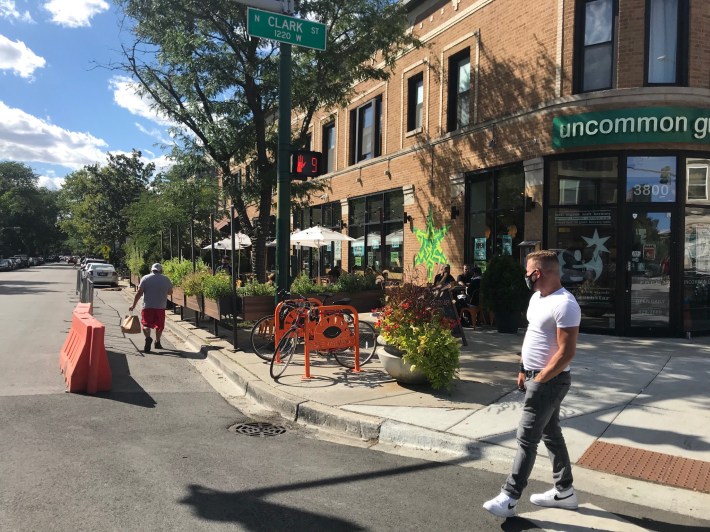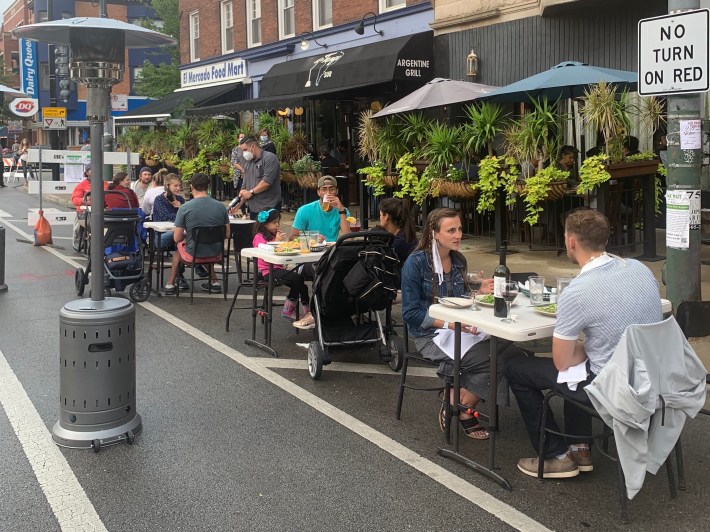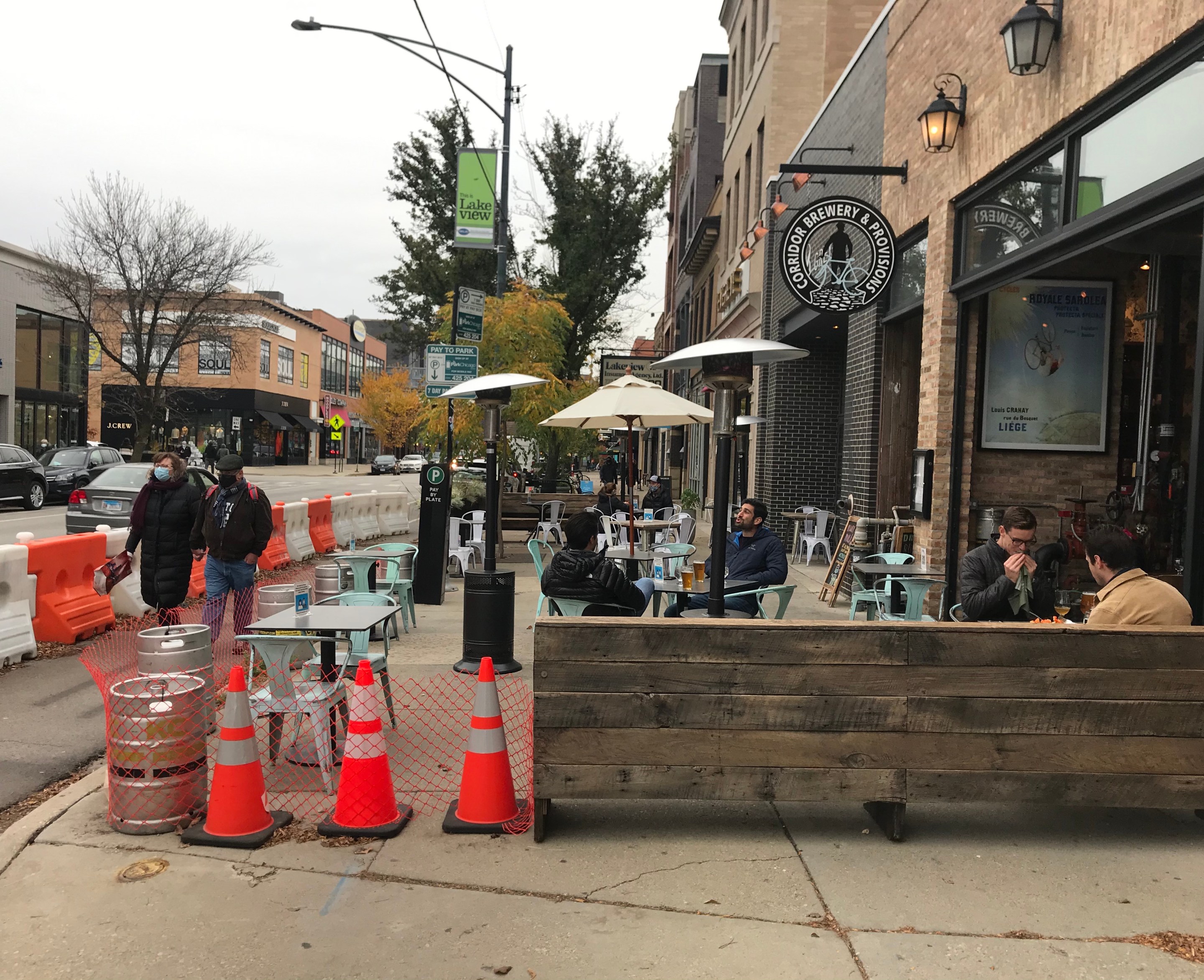These are rough times for Chicago hospitality workers and business owners. Yesterday Governor J.B. Pritzker announced that he's completely banning indoor restaurant and bar service in Chicago due to rapidly rising COVID-19 case numbers. Mayor Lori Lightfoot, who herself prohibited indoor service for bars without retail kitchens last week, is currently trying to change his mind.
Whatever the outcome of that effort, it's clear that being able to provide socially-distanced outdoor service in increasingly cold weather is going to be key for helping hospitality business survive this extremely challenging period. Public health experts also say it's much safer to dine and drink outdoors than indoors during this airborne respiratory pandemic, provided that there's adequate airflow. Solutions can include seating in tents with one or more sides open, plus space heaters.
While this summer's Cafe Streets program, which completely pedestrianized dozens of roadways to make room for outdoor seating, was hugely successful, the city hasn't indicated that will be a thing during the winter. So what can businesses do if they want to provide outdoor seating, preferably partially sheltered and heated, but they don't have a patio, parking lot, or adequate sidewalk space?
Several Chicago bars and restaurants have solved this problem by using on-street parking spaces to facilitate outdoor service. And I'm guessing that many more would go this route if they knew that the approval process isn't as complex or as expensive as one might guess.
It's possible to put the seating itself in the parking lane. Rogers Park Social, a cocktail park in the city's northeastern-most neighborhood, currently is a good example of that setup.
But several businesses in Lakeview have gone a different route, installing outdoor large seating areas that occupy the entire sidewalk in front of their businesses, and then using barriers to create an alternative route for pedestrians in the parking lane. Ramps are installed to accommodate people using wheelchairs, pushing strollers, etc.

Obviously it's not an ideal situation, since it requires pedestrians make a detour. But if the layout doesn't cause undue inconvenience for people with mobility challenges, I don't see a problem with this approach. The Active Transportation Alliance and the local disability rights group Access Living didn't respond to requests for comments on the subject by press time.
The Lakeview neighborhood has at least four businesses with this layout: Uncommon Ground cafe at Grace and Clark streets, and Corridor Brewing, Southport Grocery, and Coalfire pizzeria on Southport Avenue. The Lakeview Chamber of Commerce helped facilitate the establishment of the latter three seating areas (a fourth Southport establishment, Port & Park restaurant, is also interested in doing this), so I talked to the chamber's event and marketing manager Carisa Marconet about what kinds of bureaucratic hoops a business has to go through to make it happen. It turns out they're not especially onerous, and the permitting cost is a relative bargain thanks to the city waiving some of the associated fees.

Marconet said that, assuming the business has gotten approval and paid the fee to have a normal sidewalk cafe (in late July the city relaxed the rules to allow bars that don't have kitchens to do this), getting permission for an "expanded sidewalk cafe" involves the following process. After getting approval from the local alderman for your proposed layout, you have to submit an application to the Chicago Department of Transportation for approval of the closure of the parking lane. Once that's OKed, the Chicago Department of Business Affairs and Consumer Protection will sign off on the expanded seating.
During the pandemic, the city is waiving the additional charges for those latter two CDOT and BACP approvals, so the only permitting costs are the regular cafe permit, plus a fee for using Jersey barriers to protect the pedestrian space from traffic, Marconet said. On Southport, the local Special Service Area is covering the cost of the barriers.
While some of the layouts on Southport do take up metered parking spots, Marconet said the city is not requiring the businesses to pay for compensating the parking contract concessionaire for lost revenue. Spokespersons from CDOT and BACP confirmed the info Marconet provided about the approval process, and indicated that the city is covering the true-up fee for the metered spaces.
"In the winter, [using parking lanes this way] seems like a good way to be able to do outdoor seating without closing the whole street," Marconet said. She added that the chamber is not planning on pushing for full pedestrianization of Southport during the colder months because some restaurants wouldn't be able to participate, since many of them don't already own patio heaters, and they're currently hard to find and expensive due to supply chain issues.

However, Marconet said there was enthusiastic support for making Southport car-free to accommodate expanded outdoor dining during the warmer months. "It was great to be able to have more space for walking and seating, and some of the restaurants got really creative," such as decorating their cafe enclosures with flowers. She said that restaurateurs told the chamber they were able to provide as much seating outdoors as they do indoors during non-COVID times, so they were able to avoid laying off employees.
The response was so positive, Marconet said the chamber wants to keep the summer and fall Cafe Street program going, even after the pandemic is just a bad memory. "People just love eating outside anyway in Chicago when the weather's nice."





